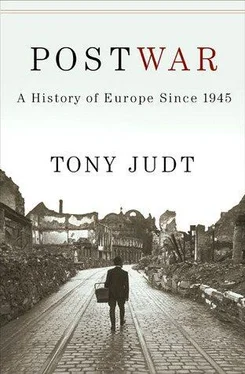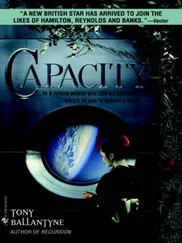Most of Germany’s foreign workers had been brought there against their will—but not all. Some foreign workers caught in the slipstream of German defeat in May 1945 had come of their own free will—like those unemployed Dutchmen who accepted offers of work in Nazi Germany before 1939 and stayed on. [5] Yet they, too, had little real choice—during the Depression years anyone who refused a proffered work contract from Germany risked losing his Dutch unemployment benefits.
Even at the derisory wages paid by wartime German employers, men and women from eastern Europe, the Balkans, France and the Benelux countries were often better off there than staying at home. And Soviet labourers (of whom there were upwards of two million in Germany by September 1944), even if they had been brought to Germany by force, were not necessarily sorry to be there—as one of them, Elena Skrjabena, recalled after the war: ‘None of them complain about how the Germans had sent them to work in German industry. For all of them that was the only possibility of getting out of the Soviet Union.’
Another group of displaced persons, the survivors of the concentration camps, felt rather differently. Their ‘crimes’ had been various—political or religious opposition to Nazism or Fascism, armed resistance, collective punishment for attacks on Wehrmacht soldiers or installations, minor transgressions of Occupation regulations, real or invented criminal activities, falling foul of Nazi racial laws. They survived camps which by the end were piled high with dead bodies and where diseases of every kind were endemic: dysentery, TB, diphtheria, typhoid, typhus, broncho-pneumonia, gastro-enteritis, gangrene and much else. But even these survivors were better off than the Jews, since they had not been systematically and collectively scheduled for extermination.
Few Jews remained. Of those who were liberated 4 out of 10 died within a few weeks of the arrival of Allied armies—their condition was beyond the experience of Western medicine. But the surviving Jews, like most of Europe’s other homeless millions, found their way into Germany. Germany was where the Allied agencies and camps were to be situated—and anyway, eastern Europe was still not safe for Jews. After a series of post-war pogroms in Poland many of the surviving Jews left for good: 63,387 Jews arrived in Germany from Poland just between July and September 1946.
What was taking place in 1945, and had been underway for at least a year, was thus an unprecedented exercise in ethnic cleansing and population transfer. In part this was the outcome of ‘voluntary’ ethnic separation: Jewish survivors leaving a Poland where they were unsafe and unwanted, for example, or Italians departing the Istrian peninsula rather than live under Yugoslav rule. Many ethnic minorities who had collaborated with occupying forces (Italians in Yugoslavia, Hungarians in Hungarian-occupied northern Transylvania now returned to Romanian rule, Ukrainians in the western Soviet Union, etc) fled with the retreating Wehrmacht to avoid retribution from the local majority or the advancing Red Army, and never returned. Their departure may not have been legally mandated or enforced by local authorities, but they had little option.
Elsewhere, however, official policy was at work well before the war ended. The Germans of course began this, with the removal and genocide of the Jews, and the mass expulsions of Poles and other Slav nations. Under German aegis between 1939 and 1943 Romanians and Hungarians shunted back and forth across new frontier lines in disputed Transylvania. The Soviet authorities in their turn engineered a series of forced population exchanges between Ukraine and Poland; one million Poles fled or were expelled from their homes in what was now western Ukraine, while half a million Ukrainians left Poland for the Soviet Union between October 1944 and June 1946. In the course of a few months what had once been an intermixed region of different faiths, languages and communities became two distinct, mono-ethnic territories.
Bulgaria transferred 160,000 Turks to Turkey; Czechoslovakia, under a February 1946 agreement with Hungary, exchanged the 120,000 Slovaks living in Hungary for an equivalent number of Hungarians from communities north of the Danube, in Slovakia. Other transfers of this kind took place between Poland and Lithuania and between Czechoslovakia and the Soviet Union; 400,000 people from southern Yugoslavia were moved to land in the north to take the place of 600,000 departed Germans and Italians. Here as elsewhere, the populations concerned were not consulted. But the largest affected group was the Germans.
The Germans of eastern Europe would probably have fled west in any case: by 1945 they were not wanted in the countries where their families had been settled for many hundreds of years. Between a genuine popular desire to punish local Germans for the ravages of war and occupation, and the exploitation of this mood by post-war governments, the German-speaking communities of Yugoslavia, Hungary, Czechoslovakia, Poland, the Baltic region and the western Soviet Union were doomed and they knew it.
In the event, they were given no choice. As early as 1942 the British had privately acceded to Czech requests for a post-war removal of the Sudeten German population, and the Russians and Americans fell into line the following year. On May 19th 1945, President Edouard Benes of Czechoslovakia decreed that ‘ we have decided to eliminate the German problem in our republic once and for all’. [6] In a speech in Bratislava on May 9th 1945, Benes declared that Czechs and Slovaks no longer wished to live in the same state as Hungarians and Germans. This sentiment, and the actions that followed, has haunted Czech-German and Slovak-Hungarian relations ever since.
Germans (as well as Hungarians and other ‘traitors’) were to have their property placed under state control. In June 1945 their land was expropriated and on August 2nd of that year they lost their Czechoslovak citizenship. Nearly three million Germans, most of them from the Czech Sudetenland, were then expelled into Germany in the course of the following eighteen months. Approximately 267,000 died in the course of the expulsions. Whereas Germans had comprised 29 percent of the population of Bohemia and Moravia in 1930, by the census of 1950 they were just 1.8 percent.
From Hungary a further 623,000 Germans were expelled, from Romania 786,000, from Yugoslavia about half a million and from Poland 1.3 million. But by far the greatest number of German refugees came from the former eastern lands of Germany itself: Silesia, East Prussia, eastern Pomerania and eastern Brandenburg. At the Potsdam meeting of the US, Britain and the USSR (July 17th-August 2nd 1945) it was agreed, in the words of Article XIII of the subsequent agreement, that the three governments ‘recognize that the transfer to Germany of German populations, or elements thereof, remaining in Poland, Czechoslovakia and Hungary, will have to be undertaken.’ In part this merely recognized what had already taken place, but it also represented a formal acknowledgement of the implications of shifting Poland’s frontiers westwards. Some seven million Germans would now find themselves in Poland, and the Polish authorities (and the occupying Soviet forces) wanted them removed—in part so that Poles and others who lost land in the eastern regions now absorbed into the USSR could in their turn be resettled in the new lands to the west.
The upshot was de jure recognition of a new reality. Eastern Europe had been forcibly cleared of its German populations: as Stalin had promised in September 1941, he had returned ‘East Prussia back to Slavdom, where it belongs.’ In the Potsdam Declaration it was agreed ‘that any transfers that take place should be effected in an orderly and humane manner’, but under the circumstances this was hardly likely. Some Western observers were shocked at the treatment of the German communities. Anne O’Hare McCormick, a New York Times correspondent, recorded her impressions on October 23rd 1946: ‘The scale of this resettlement, and the conditions in which it takes place, are without precedent in history. No one seeing its horrors first hand can doubt that it is a crime against humanity for which history will exact a terrible retribution.’
Читать дальше












